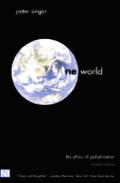One World: The Ethics of Globalization by Peter Singer (2nd edition)
Reviewed by Jane Shevtsov In this book, Singer starts off by stating that "the basic unit for our ethical thinking" should be the whole world. "The value of the life of an innocent human being does not vary according to nationality." He asks, "Is the division of the world's people into sovereign nations a dominant and unalterable fact of life?" (Unfortunately, he does not return to that question.)
In this book, Singer starts off by stating that "the basic unit for our ethical thinking" should be the whole world. "The value of the life of an innocent human being does not vary according to nationality." He asks, "Is the division of the world's people into sovereign nations a dominant and unalterable fact of life?" (Unfortunately, he does not return to that question.)
On the Kyoto Protocol: "[The] targets were arrived at through negotiations with government leaders, and they were not based on any general principles of fairness, nor much else that can be defended on any terms other than the need to get agreement. This was necessary since under the prevailing conception of national sovereignty, countries cannot be bound to meet their targets unless they decide to sign the treaty that commits them to do so."
On economic globalization: "Even those who accept the general argument for the economic benefits of a global free market should ask themselves how well a global free market can work in the absence of any global authority to set minimum standards on issues like child labor, worker safety, the right to form a union, and environmental and animal welfare protection."
Writing about the ICC, Singer makes a point global government advocates have been known to forfeit: "Why the United States should expect its nationals to be treated differently from the nationals of all other nations has never been made clear."
Singer has much to say about UN reform. He supports an independent UN military force, abolishing the veto and transforming the General Assembly into a World Assembly of elected delegates, with a country's number of delegates proportional to population.
Singer does talk a little about global government. He seems to cautiously support the idea, and thinks we should see how the European Union works out before trying a global federation. "To rush into world federalism would be too risky." (However, he doesn't consider the issue of war itself anywhere in the book -- the subtitle, after all, is The Ethics of Globalization, not The Ethics of World Government).
Here is Singer's final paragraph. I find his use of "government" rather than "governance" here interesting, since he uses both terms throughout the book. "The twentieth century's conquest of space made it possible for a human being to look at our planet from a point not on it, and so it see it, literally, as one world. Now the twenty-first century faces the task of developing a suitable form of government for that single world. It is a daunting moral and intellectual challenge, but one we cannot refuse to take up. The future of the world depends on how well we meet it."

